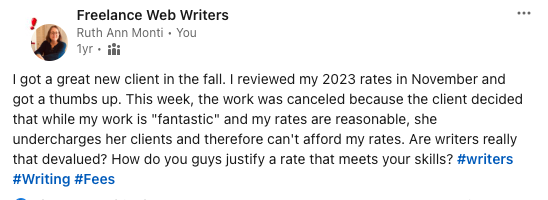
About a year ago, I posted a lament on LinkedIn’s Freelance Web Writers group about losing a client who didn’t want to pay my rate, even though she agreed it was a fair one and my work excellent. “I don’t charge my own clients enough, lol,” she emailed me (or something to that extent.)

(The red exclamation point is the logo for this group’s page.)
This post got about 500 impressions, which is pretty good for a small player like me, and a handful of sympathetic comments like these:
- “It’s hard not to picture a scenario where you could have kept the client if you had made your rates more affordable for them. But doing that won’t speak well for you and the freelance writing community in general.”
- “…agencies and content resellers/packagers were able to increase their margin on marketing packages through up charging for the content portion. But as good writers have become harder to find, this is no longer a viable business option.
For whatever reason, this post is now getting more attention, or at least more impressions.
I’m tempted to update it with a note that over the past year, I have lost two clients to AI. Which brings me to the question: how can we writers and artists compete with AI? Why are we even in this position?
AI is a Real Threat to Real People
I’ve complained about AI in the past for its utter lack of respect for fresh ideas. As it “scrapes” the web for content, it doesn’t seem to be terribly concerned about crediting people’s ideas. It just takes them.
How do I know this? Because someone who ran an article I wrote back in 2015 through a plagiarism tool told me it appears I didn’t write it.

Ouch. Lucky for me (I guess), the article was put through another tool that noted the article appeared to be written by me because it matched the tone and styles of other articles under my byline.
This is a big problem because much of what I write isn’t under my byline. I do what amounts to ghostwriting blogs and articles as well as website pages that aren’t normally bylined anyway. Now when I do offer up a writing sample, an AI tool can claim I’m essentially a thief because someone (or something) else helped themselves (or itself) to my work.
This is one reason why writers who work in Hollywood went on strike last summer and later, the actors. AI is replacing both groups of professionals. Closer to my home, AI is a popular, cheaper choice to create actual scripts, books, and web content. As I said above, I’ve personally lost business to AI for blogging and more recently, ghostwriting books.
Why Shouldn’t Businesses Save Money With AI?
That’s the question I grapple with and the reason I’ve come up with (at least as far as writing goes) is quality.
Remember quality? Ford used to say “Quality is Job 1.” (Of course, keeping investors happy supercedes this as anyone who’s “driven a Ford…lately” can attest.) As I recently explained to a potential client, quality written content for a website means proper grammar, lots of white space and images, SEO techniques, and frankly, a soul behind the work.
I can spot AI-generated content. It’s usually boring. It can’t be playful and engage (or at least wake up) a reader by mixing short sentences with longer ones or asking questions. I rarely learn something new from AI-generated content.
AI-generated content can provide definitions, which is useful. It’s not good at generating engaging content people will want to read or skim.
This is my “quote.” The callout plugin I use hasn’t been updated and I can’t find one that would work. I suppose I could code this but… 🙁
AI-generated content is good for one thing: it can provide specific definitions by collecting content. Can it analyze different points of view? I don’t think so, at least not without “scraping” (i.e., stealing) someone else’s work.
Yes, clients will save money but my bet is the guy whose book I ghost-wrote will find that his AI-written books aren’t as much fun to read and will no doubt include plagiarized content.
If the end goal is to save money, then AI works. If it’s to deliver engaging, well-written content to attract potential customers, it won’t work.
Google Doesn’t Love AI-Generated Content, at Least Not Yet
Google is still developing its Gemini tool (it used to be called Bard, an ironic name if there ever was) but as far as search goes, it isn’t kvelling over AI-generated content. In fact, Gemini is marketed as a writing tool, not a replacement for writers. Not yet, at least.
For years, Google has stressed that it rewards quality, authoritative content. Some content created through AI might meet these standards but too often, I spot grammatical errors that can get caught in Google’s spam detectors. It’s one thing to have a couple of errors in a long-form article, but a dozen or in a 500-word blog doesn’t exactly inspire confidence among educated readers and apparently, the dominant search engine.
In fact, Google just unleashed an antispam update that targets a lot of older sites that once engaged in black-hat practices or had thin, minimally useful content. (Or both.) Barry Schwartz has a good summary and entertaining snapshots of comments he found on X comments on SEO Roundtable.
AI isn’t necessarily spammy though, as Julia McCoy wrote for Search Engine Land last year. Google can identify it, but it won’t penalize it for being what it is. Google penalizes poorly-written content regardless of the source.
McCoy lays out why AI-generated content needs a human touch, using the CRAFT acronym to explain this:
C – Cut the fluff (she’s being polite here, I would have used another C-word).
R – Review, which means editing and optimizing using whatever tools you have. I like the Yoast tool that should be on every WordPress site. In fact, I always have Yoast in the back of my mind whenever I write anything, even an email.
A – Add images.
F – Fact -check, and I wish that included acknowledging sources.
T – Trust, as in inspire this using a personal story and tone (hello!) and links.
Learning to Live with AI-Generated Content
I still feel – strongly – that human writers and artists are superior to AI. And AI’s creators and enablers know it, too.
For one thing, I used to get multiple requests to work as an “AI trainer” and “teach” AI how to write. One recruiter explained to me that AI reads “like a machine generated it,” which, duh. The company wanted professional writers to teach it to write like a person.
However, like my former client, they didn’t want to pay a professional rate. Throw in the commuting headache, and it just wasn’t worth it to me. (Yes, these people wanted their writers to work onsite, no doubt in a cubicle right smack in a noisy sales department. Been there, done that.)
Go ahead and give AI a chance to write your content. When you see your analytics slip, give me a call. I’ll be happy to correct the errors this wonderful tool didn’t catch and if you pay me enough, I’ll brighten the content as well.
I
P



